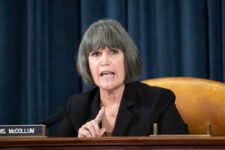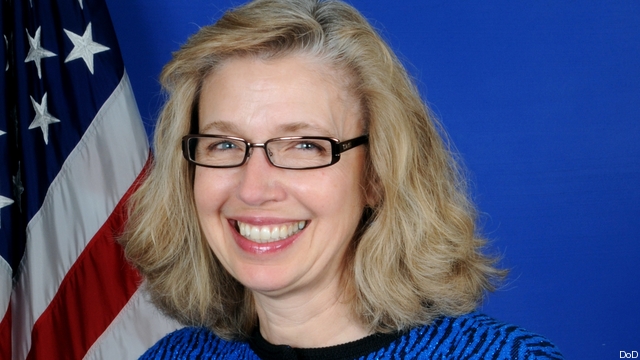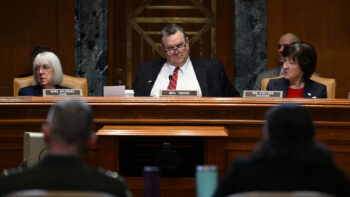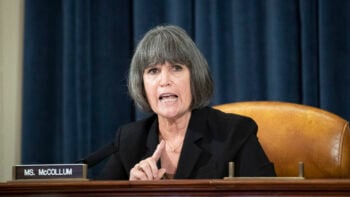WASHINGTON: The fact that the Obama administration selected Christine Fox, the former CAPE director, as Deputy Defense Secretary illustrates two truths: First, several people turned down the job or withdrew from consideration because of the hideous confirmation process; second, the political impulse to place a female in the position was intense and, ultimately, successful.
Those weren’t the reasons Defense Secretary Chuck Hagel gave in his press conference this afternoon, of course. “I recommended Christine to President Obama because I felt we needed the continuity,” he said, particularly in the face of sequestration and other budget troubles: While Fox had left the Pentagon just a few months ago, until this summer she had served under three secretaries in a row as director of the Cost Assessment and Program Evaluation office, a favorite of Congress for its close watch on overbudget or underperforming programs. Said Hagel, “she’s highly respected in the Congress, in the White Huse, and certainly around here.”
But Fox was not the slam-dunk choice. Several likely candidates — former policy undersecretary Michele Flournoy and former BAE CEO Linda Hudson chief among them — are understood to have declined either because of the demands of the job (you have no life outside work) or because of the horrors of the confirmation process. My personal favorite of the rumored candidates was Dave Oliver, former CEO of EADS North America and former principal deputy undersecretary for acquisition and logistics. But Dave is male and is not widely known for his diplomatic skills, though he possesses considerable charm and, most importantly, knows how to manage effectively and to force policy decisions. Oliver would be an intelligent choice to manage the Pentagon during times that will only grow tougher and require decisions few will want to make.
The Obama administration’s pool was even smaller because several senior Pentagon officials who might have been promoted — DoD Comptroller Bob Hale and acquisition czar Frank Kendall — were male and because their departure would have left their positions open, causing even more confirmation problems.
After all, who wants to face the Senate Republican confirmation gauntlet, open their financial records to scrutiny, put much of their earnings into a blind trust or sell stock, and then have a job in the second half of a lame-duck presidential term during which you would preside over a declining defense budget and face innumerable political and military choices with few happy outcomes possible? They may be out there, but there ain’t many of them. Of course, those are the same obstacles that someone who has not recently served in the Pentagon would face.
Limiting the DepSecDef pool to females drastically restricts the administration’s options, especially if they are inclined to select someone with aerospace industry or congressional staff backgrounds.
“Presidential advisor Valerie Jarrett has been pressing White House officials to name more women to national security positions ever since John Kerry and Chuck Hagel got the top two security-related cabinet positions,” notes Loren Thompson. A former congressional staffer who held a senior Pentagon position pointed to Fox’s selection, noting that acting secretaries sometimes get their portraits done. If Fox’s portrait gets done and hung in the building, then — this wag noted — the administration will have lasting proof that it did appoint the first woman to this very important position, regardless of who gets nominated to permanently fill the position.
Fox got mixed reviews as a selection from the half-dozen sources I spoke with. Politically, she’s a no-brainer. She is an accomplished analyst and knows the Pentagon budget numbers and programs better than almost anyone after her time running CAPE. “The problem, though, is that the deputy secretary’s job is mostly about management, and Fox doesn’t have the requisite credentials for that,” Thompson wrote in an email. “The need to find a first-rate manager is made more urgent by the fact that the defense secretary himself is a weak manager. You can’t expect the government’s biggest department to be a good shepherd of taxpayer money if it is run by people with weak management skills.”
The other source said Fox, who ran CNA (known to old timers as the Center for Naval Analyses), “is a very capable bureaucrat. Is the job probably a little too big for her? Probably.” The former senior defense official suggested the administration “hire someone who has run a company, and not a defense company.” If the political impulse to select a female remains paramount, the administration should look at leaders at the metal bending industries like the auto companies. Perhaps Mary Barra, the highest ranking woman at GM, might make sense. Ironically, four of the 50 women on the Fortune List of 50 Most Powerful Women hail from the defense companies, including Marillyn Hewson, Lockheed’s CEO. But imagine the obstacles they would face during the confirmation process and the financial hit they would all take.
“The problem is none of these women are going to want to cope with all the bullshit they have to deal with in the confirmation process,” noted our sage former defense official.
All indications from the building are that Fox is an interim pick. She can serve 210 days thanks to a wonderful law called the Federal Vacancy Reform Act. It lets the president pick a senior agency employee to be an acting if they have served in the department 90 of the past 365 days. Fox and the administration now have 210 days to nominate someone.
Key Senate appropriators signal push for higher FY25 defense topline
Jon Tester, the Montana Democrat who chairs the subcommittee, and Susan Collins, the ranking Republican from Maine, stated that they are in lockstep that the military needs more money, despite a budget cap imposed by the Fiscal Responsibility Act.


























